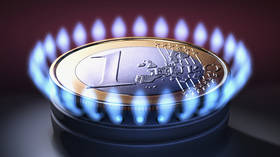Germans warned of potential energy crisis next winter

Germany has managed to avoid an energy crisis this winter, but there is a risk that the next heating season will be more difficult, Klaus Mueller, the head of Germany's Federal Network Agency said in an interview with the Rheinische Post, published on Saturday.
According to Mueller, the country’s gas storage facilities are currently 64% full, and even if it the weather turns cold in the next few weeks, German energy supply for the remainder of the heating season is secured. He warned, however, that “we should not relax, as things could be different next winter.”
“We cannot rule out a gas shortage for next winter. Risk factors are that the winter of 2023/24 will be very cold, that households and companies will save too little, that the LNG terminals will not work as planned – we would also have to help our neighboring countries with their energy problems,” Mueller explained. Germany largely managed to avoid energy shortages due to unseasonably mild weather throughout the past couple of months, but Mueller noted that with respect to the next heating season, the weather poses the biggest risk.
“We cannot rely on the fact that next winter will be mild again. When it's cold, many households immediately stop saving. In warm October they saved more than 20% of gas, while during the cold snap in December – only 7%.”
The official also pointed to another risk factor – the absence of Russia’s energy supplies, which made it possible for the country to fill up storage tanks in preparation for the heating season last year. While the EU did not ban Russia’s pipeline gas imports, their flows dwindled significantly after Ukraine-related sanctions and following the sabotage that disabled the Nord Stream 1 pipeline, one of the main routes for Russian gas to Europe. As a result, Germany no longer receives Russian gas directly, and according to Mueller, energy prices will no longer be as low as they were when it did.
“We don't know what will become of Russia's remaining gas supplies… We have to get used to higher prices, the time of cheap energy from Russia is definitely over,” he stated.
Gas prices have been relatively low throughout the winter, helped by lower demand due to mild weather. Wholesale gas prices, which had soared over €300 per megawatt hour late last summer, fell to a level of around €50 in March. While that is far more than what natural gas cost in early 2021, it is “the new normal,” Mueller said, noting that in order to avoid further price spikes, consumers would have to continue efforts to conserve energy.
For more stories on economy & finance visit RT's business section













